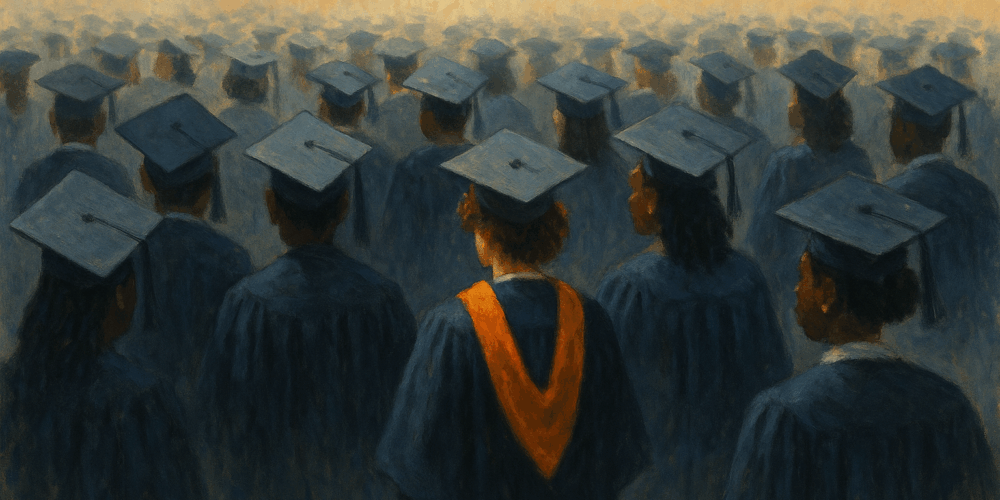Keep you, you

I was attending my son’s university graduation ceremony recently, and amidst the pomp and parental joy of the great occasion, I caught a snippet of profundity in the air. The university’s chancellor, in giving his congratulatory words to the students, made this phrase his final piece of advice to those going out into the world:
Keep you, you.
Three words, one repeated, and a comma. That’s all it takes to proffer elegant and deeply meaningful guidance. I felt moved and exhilarated, and want to expound today on what that bit of counsel might mean.
It seems rather obvious on the surface. You are, after all, you, and only you. Do you really need to be advised to be you? Yes, you do.
One of the great superpowers of humans as a species is our ability to transmit and collaborate. All our greatest achievements have come from observing others and learning from them. None of us needs to start from scratch; we already sit atop the shoulders of the billions of sapiens who preceded us, and who have imparted their knowledge and experiences to us. Equally, we can observe and learn from the eight billion around us today.
Mimicry and imitation are in the DNA of the human being. We watch those we admire, and aspire to become like them. We copy, benchmark, shadow, and mirror. That’s why those of us in particular cultures dress similarly, speak in cadence, and behave in recognisable patterns. We imitate and impersonate.
And yet.
Chancellor Paul Lindley understood the point about commonality and tried to take the students (and parents) before him that day beyond it. We do indeed observe and assimilate the work of others—what else is a university, after all? But our greatest impact will not come from what we gather from others, but what we become ourselves. And for you to become the best version of yourself, you have to keep you, you.
Even as you learn, absorb, and grasp, you must bring your own uniqueness to the knowledge. We add little as mere clones of one another; our true contribution comes from a deep singularity. Your individuality and particularity will be the place from which your unique contribution flows. And if you have been granted the privilege of advanced education, you should indeed accept the challenge and responsibility of developing your originality. Society advances not just through propagation, but also through innovation and even insurgency.
Strategically, when we mimic, we degrade. We concede that we are not quite good enough, that others are better. When we engage in parroting and trend-tailing, we are just repeating what’s already done, riding on what’s already moving. Our lives become one long karaoke act—performing songs already done better by others.
At a personal level, there is great psychological advantage in keeping you, you. Inordinate pressure to be like others is a huge mental burden to carry in our lives. It keeps us trapped in a comparison game, a wild goose chase in which we can never be quite good enough. Sameness seduces because it promises safety—and steals peace. Live by comparison and your victories taste like someone else’s recipe. The relief in keeping you, you, is not swagger; it’s weight off the shoulders. When you switch from ranking to making, the noise lowers. The day feels yours again.
To locate your individuality is to find yourself. To celebrate it is to find your distinction. Your best work will have your own fingerprints, not just those of others. So how do you move “keep you, you” from advice to habit? Reduce the gazing at trends and influencers. Make space to find yourself. Note down three simple sentences that spell out how you work at your best, and then check in every so often to see if you are sticking to you, or slipping into impersonation.
It was a sea of gowns on graduation day, same cut, same colour—yet each life under there, wildly singular. The challenge ahead for every one of those youngsters? Do the learning together; do the living in your own voice.
THE SIGNAL IN THE NOISE
Humans win by learning from others. Humans lose themselves by living as others.

Buy Sunny Bindra's new book
The X in CX
here »
Popular Posts
- Make this your year of being boringJanuary 4, 2026
- Can we please stop with the corporate jargon?January 11, 2026
- The man who passed by one markJanuary 18, 2026
- My books of the yearDecember 14, 2025
- Confessions of an explaining personDecember 7, 2025















